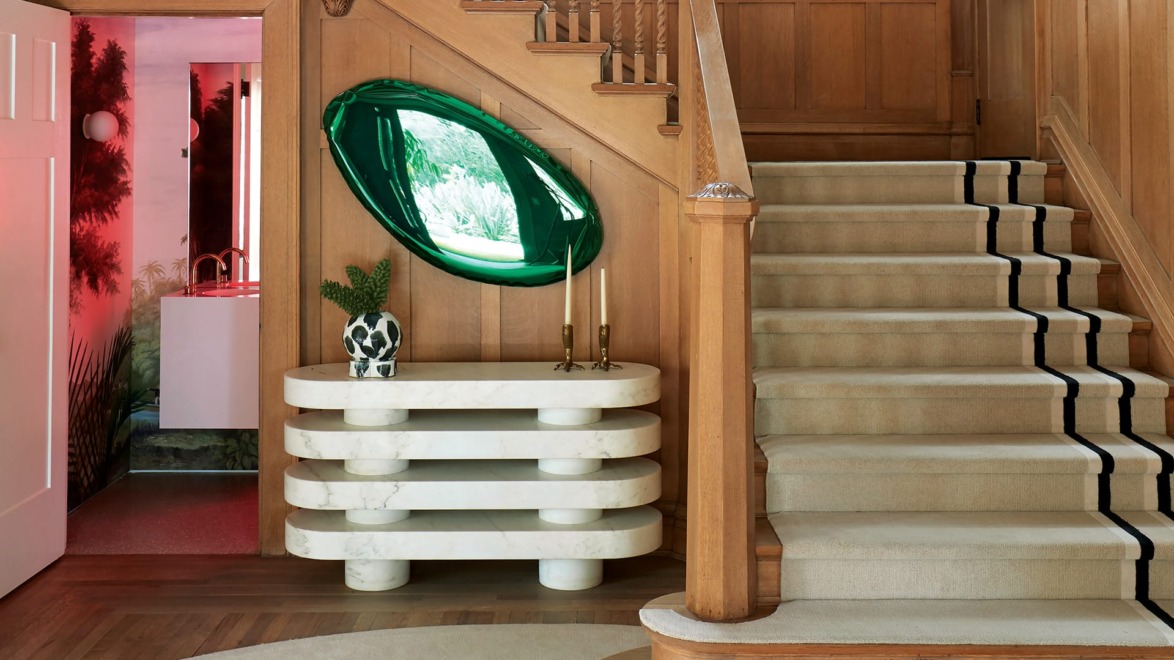5 Leading Interiors Experts Detail How to Craft a Beautiful Stairway
Designers transform these functional spaces into breakout moments of aesthetic splendor

With their various zigs and zags, stairs can be a designer’s most complex task, but in the hands of an out-of-the-box creative, this space can also be a home’s grandest focal point. “The difficulty of the stair is you can see beyond it in so many ways,” says Ghislaine Viñas, who has created showstopping staircases with custom murals, Technicolor paints and rugs, and unexpected lighting fixtures. “There has to be a strategy behind all the rooms around it.”
Not just a pragmatic passageway from one floor to another, stairs provide the platform for an eye-catching moment to connect the multitude of styles that run throughout a home. “It becomes that juncture to have a thread both color- and texture-wise,” says Steven Gambrel. “It’s such a great opportunity that it seems a shame not to make it a statement piece.”


First Rung
With so many points of entry, designers must consider how a staircase is viewed from all angles. For new builds, particularly in a city, Gambrel favors spiral styles that connect floors in a seductive swoop, although they can be more challenging and costly. “Being that we’re here to improve, it’s a nice occasion to add more detail to a place that may not have had that much,” he says.
However, these nautilus shapes leave square footage at the base that needs a grounding element. Many designers place a pedestal table, commode, or piece of art in that void. “You just installed this big squiggly thing that everybody’s going to be looking at, so you should fill that triangle in the underside with an object that’s just as important,” adds Thomas McManus, a partner at architectural firm Ferguson & Shamamian, who collaborated with Victoria Hagan on a wavelike staircase in a Hamptons home that the interior designer paired with a Goutte d’Eau table by Ado Chale and a Grace floor lamp by Paul Mathieu from Ralph Pucci.

Higher Power
Open risers are a popular choice in modern designs, like the floating stair Magni Kalman Design cantilevered over a reflecting pool for a home in the Pacific Palisades neighborhood of Los Angeles. “I like when a stair has an event happening to it,” says principal James Magni. “In this house we had very tall ceilings, so you had to go quite a distance to get from A to B, so getting that proportion right was a challenge.”
On the other hand, more traditional designers tend to cover closed risers with a high-impact runner. For Gambrel, that usually comes with a contrasting two-inch band. “It starts to reinforce the shape of the stairs and tie all the pieces together,” says Gambrel. “Any time you can delineate the edge it helps you define what’s happening.”
Not just a necessary sound barrier, runners offer a fantastic possibility for expression. “People have become more inclined to be a little bit outrageous on the stair because the opportunity is there,” says Viñas. “The carpet and how you treat the floor is often a wonderful canvas to be super creative.”

Elevated Details
Both paint and wallpaper can be used to striking effect. For a historic Philadelphia home, Gambrel utilized muted shades of blue and gray to emphasize the beveled edges of wall panels. Redd Kaihoi’s Miles Redd looks to cinematic wall coverings to create a transportive atmosphere, as in a Connecticut project he conceived featuring a bespoke Iksel mural. “I like each room to contrast,” he says. “The central hall was the paper, then you step into a wood-paneled library and upholstered walls in the living room that act as a foil to those spaces.”
Of course, the area carved out in the center of the stair creates a near irresistible moment for a chandelier with serious volume. Others, however, prefer the staircase to act as sculpture and the lighting to disappear. “We try to integrate it into the stair itself, so it creates this nice, beautiful glow as you ascend or descend,” says Jason Kalman of Magni Kalman Design. “We read the stair as an architectural element, so we treat the lighting as an architectural element as well.”
Viñas agrees: “A staircase is a sculpture. Once you’ve got the form down and your stairs and treads are the right dimension, you can start playing and do anything really.”
A version of this article first appeared in print in our 2024 Fall Issue under the headline “Step Ahead.” Subscribe to the magazine.






























